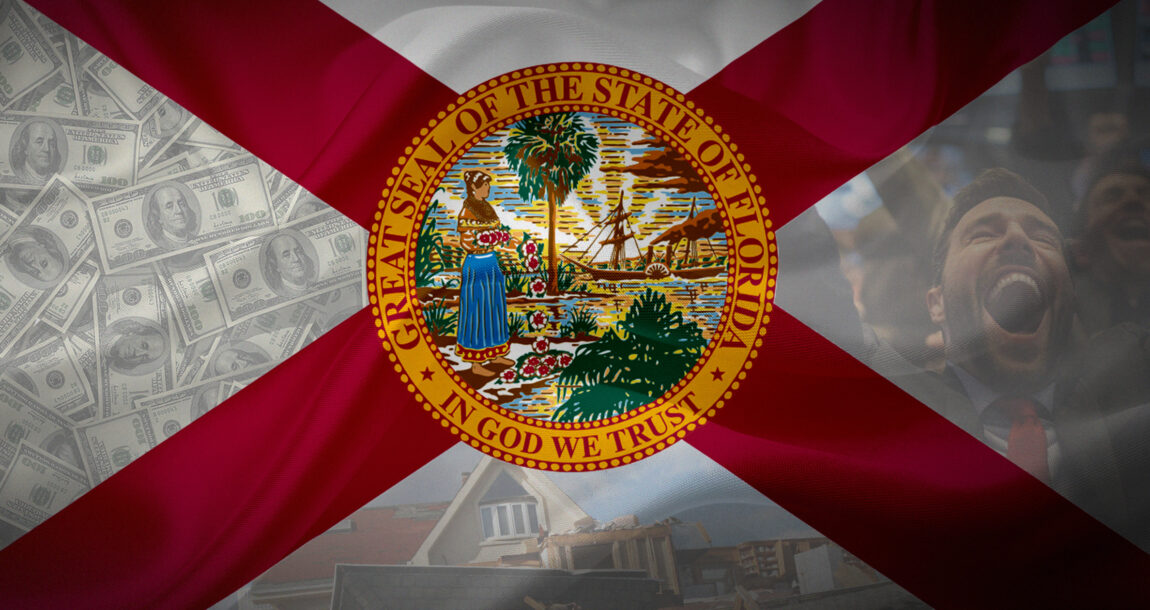Report: Florida insurers claimed losses while making money for investors

Florida insurance regulators learned from an internal 2022 report – which had reportedly been withheld for two years – that insurers, parent companies and affiliates were making billions in profit at a time they were claiming losses from damaging hurricanes.
Extensive damages caused by Hurricane Irma in 2017 and Hurricane Michael in 2019 marked the start of the state's insurance crisis. Many insurers ceased offering policies or aggressively lobbied lawmakers for market adjustments.
While this was happening, executives distributed $680 million in dividends to shareholders while diverting billions more to affiliate companies, the Tampa Bay Times reported in breaking the story about the internal report.
The newspaper said the Florida Office of Insurance Regulation report was withheld for two years. It revealed that some insurers removed so much money from their companies that they violated state laws, while others struggled to pay claims.
The Times's article linked to the report, but those links were not working Monday afternoon.
The press secretary for OIR pointed out that the report presaged the need for more oversight, and came before regulators gained any supervision over managing general agents.
"Since the historic legislative reforms, OIR has gained more regulatory authority and has since canceled or modified MGAs agreements," said Shiloh Elliott, press secretary for the OIR, in an email. "The Office also continues to advocate for more oversight in this space each legislative session. The Office has terminated, modified, and placed duration limits on these contracts and required companies to provide an excruciating level of justification for them."
Lucrative affiliate strategy
Many insurers rely on affiliates in an increasingly controversial structure. Insurance company profits are limited in Florida by state regulations. Many insurers get around this through the creation of affiliates, who then charge back the insurance company for services such as marketing, underwriting and or data analytics, to name a few.
Profits and executive compensation of insurance companies are capped, the profits of affiliate and parent companies are not, the Tampa Bay Times reported.
"OIR believes that there needs to be a clearer definition of fair and reasonable fees and fees charged as whole dollar amounts as opposed to percentages and seeks direct regulatory oversight of Insurance agents engaged in the MGA business model," Elliott said. "OIR has provided language to the Legislature each session since the commissioner’s arrival to define fair and reasonable; however, it has not succeeded."
But Doug Quinn, executive director for the American Policyholder Association, said OIR is just making excuses for the failure to properly regulate insurance companies. The internal report remained in draft form for two years, and was not shared with regulators, he noted.
That is "quite a breach of fiduciary responsibility," Quinn said. "Especially in light of the fact that taxpayer dollars were used to fund the study."
Florida officials have taken the offensive in recent months to stress how the state property insurance market is rebounding.
© Entire contents copyright 2025 by InsuranceNewsNet.com Inc. All rights reserved. No part of this article may be reprinted without the expressed written consent from InsuranceNewsNet.com.
InsuranceNewsNet Senior Editor John Hilton has covered business and other beats in more than 20 years of daily journalism. John may be reached at [email protected]. Follow him on Twitter @INNJohnH.






Four of the biggest ethical challenges when using AI in insurance
IUL vs. annuities: Settling the debate
Advisor News
- DOL proposes new independent contractor rule; industry is ‘encouraged’
- Trump proposes retirement savings plan for Americans without one
- Millennials seek trusted financial advice as they build and inherit wealth
- NAIFA: Financial professionals are essential to the success of Trump Accounts
- Changes, personalization impacting retirement plans for 2026
More Advisor NewsAnnuity News
- F&G joins Voya’s annuity platform
- Regulators ponder how to tamp down annuity illustrations as high as 27%
- Annual annuity reviews: leverage them to keep clients engaged
- Symetra Enhances Fixed Indexed Annuities, Introduces New Franklin Large Cap Value 15% ER Index
- Ancient Financial Launches as a Strategic Asset Management and Reinsurance Holding Company, Announces Agreement to Acquire F&G Life Re Ltd.
More Annuity NewsHealth/Employee Benefits News
- After enhanced Obamacare health insurance subsidies expire, the effects are starting to show
- CommunityCare: Your Local Medicare Resource
- AG warns Tennesseans about unlicensed insurance seller
- GOVERNOR HOCHUL LAUNCHES PUBLIC AWARENESS CAMPAIGN TO EDUCATE NEW YORKERS ON ACCESS TO BEHAVIORAL HEALTH TREATMENT
- Researchers from Pennsylvania State University (Penn State) College of Medicine and Milton S. Hershey Medical Center Detail Findings in Aortic Dissection [Health Insurance Payor Type as a Predictor of Clinical Presentation and Mortality in …]: Cardiovascular Diseases and Conditions – Aortic Dissection
More Health/Employee Benefits NewsLife Insurance News
- Baby on Board
- Kyle Busch, PacLife reach confidential settlement, seek to dismiss lawsuit
- AM Best Revises Outlooks to Positive for ICICI Lombard General Insurance Company Limited
- TDCI, AG's Office warn consumers about life insurance policies from LifeX Research Corporation
- Life insurance apps hit all-time high in January, double-digit growth for 40+
More Life Insurance News